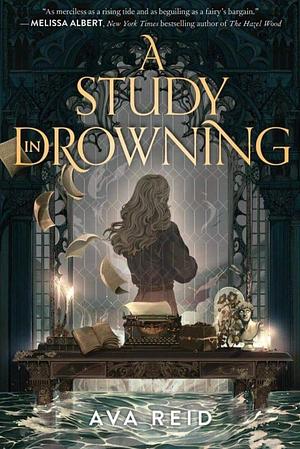
A Study in Drowning
by Ava Reid
Genres: Fantasy, RomancePages: 378
Rating:

Synopsis:Effy Sayre has always believed in fairy tales. Haunted by visions of the Fairy King since childhood, she’s had no choice. Her tattered copy of Angharad—Emrys Myrddin’s epic about a mortal girl who falls in love with the Fairy King, then destroys him—is the only thing keeping her afloat. So when Myrddin’s family announces a contest to redesign the late author’s estate, Effy feels certain it’s her destiny.
But musty, decrepit Hiraeth Manor is an impossible task, and its residents are far from welcoming. Including Preston Héloury, a stodgy young literature scholar determined to expose Myrddin as a fraud. As the two rivals piece together clues about Myrddin’s legacy, dark forces, both mortal and magical, conspire against them—and the truth may bring them both to ruin.
Part historical fantasy, part rivals-to-lovers romance, part Gothic mystery, and all haunting, dreamlike atmosphere, Ava Reid's powerful YA debut will lure in readers who loved The Atlas Six, House of Salt and Sorrows, or Girl, Serpent, Thorn.
Ava Reid’s A Study in Drowning is a bit of a complex one to review for me. Let’s start with it just as a story. It’s a dark academia type setup, following a young girl, Effy, at the architecture college in a fantasy world. She’s the only girl admitted, and she’s only there because the literature college point-blank refused to allow her admission. There’s some kind of dark cloud around her because one of her professors tried to sleep with her, leading to predictable slut-shaming.
Given a chance to design a house for the son of an author she’s loved all her life, Emrys Myrddin, Effy jumps at it as a way to get away from the college, and also show she’s made of stern stuff. There she meets her “rival” Preston Héloury, who is half-Argantian, a country at war with Effy’s home. He’s from the literature college (how dare he, etc, etc), investigating Emrys Myrddin’s legacy in his papers and documents, after his recent death.
The story unfolds with some genuine atmosphere, with Effy doubting her sanity and a real sense of desolation, danger and decay. Her relationship with Preston develops swiftly and predictably, and she comes across as a bit of a brat as she snipes at him for being half-Argantian, and assumes the worst in everything he says.
There are some really impactful lines and scenes, and I think Effy’s desperate defence of Myrddin Emrys’ work and what it’s meant to her is well-depicted. The things the book has meant to her make sense, and her love of it feels real. That aspect of the story I enjoyed, even if I found the denouement somewhat predictable.
But.
First of all, there’s a few inconsistencies, or at least, details that seemed odd. For example, early in the novel it mentions that a lesson is being given in Argantian, because that might soon be the language spoken in Llyr. Later we’re told that Llyr is winning. And there’s the fact that Effy gets slut-shamed, and yet… there’s no real outcry at the idea of unmarried women in the story, for instance. It’s like the author forgets about it when it’s inconvenient. The level of technology also feels inconsistent, though that may be in part because of the setting of much of the book, Hiraeth Manor.
Which brings me to my other issues with the story. There are a number of Arthurian themes and names introduced: Myrddin Emrys, Master Corbenic, the fatherless child who should be slain on foundations in order to get them to stand firm, and possibly the idea of the Sleepers…
And that’s… seemingly… it? Otherwise Myrddin gets linked to Faerie, not Arthur, and the rest of the story vaguely uses some Welsh orthography and names without really engaging with actual Welsh myth (instead with a more modern conception of Faerie that seems to me half drawn from modern novels more than part of any coherent body of folklore). I’m not sure why the house is called “Hiraeth Manor”, because there’s very little about the house that evokes the concept of hiraeth — it’s not an entirely inappropriate concept for the name of a house, but it feels like that’s it, it’s just a borrowed word.
It’s also rather icky that the author has pasted Welsh orthography and names onto a culture that we get told is pretty colonialist. While Welsh people have participated in driving British imperialism, absolutely no doubt of that, a more nuanced look at history shows that Wales was pretty much England’s first colony. That legacy isn’t some kind of centuries-old history, it’s alive and well today, when for example Welsh parents were systematically told not to teach their disabled children Welsh because it would hold them back.
(If you have trouble with this concept, may I recommend Kirsti Bohata’s Postcolonialism Revisited? There’s probably been more recent work, but I’ve been out of the field for over a decade now, and this is a very useful and illuminating read.)
So… yeah. The more I think about it, the worse I feel about this book, for a variety of reasons. There were aspects of it I enjoyed, while reading it, but it falls apart like tissue-paper when I look back on it. In rating it, I’ve tried to square those two reactions: the 2-3 stars I might’ve given it without thinking it over too much, and the 1 I’d give it right now as I’ve written it out and thought it through. 2 it is.
Rating: 2/5
